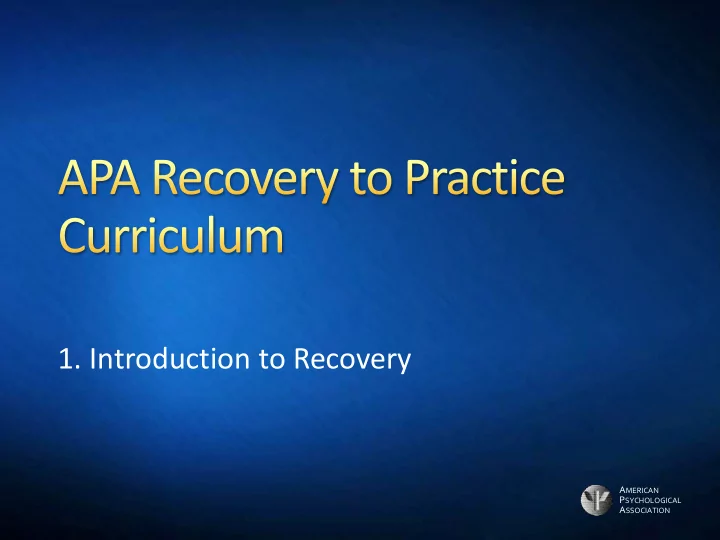

1. Introduction to Recovery A MERICAN P SYCHOLOGICAL A SSOCIATION
Historical Context Until the mid-1970s, conventional wisdom regarded a serious mental illness as a deteriorating, debilitating disease Repeated hospitalizations Focus on symptom reduction Power was in the hands of the provider Recovery from serious mental illness was thought NOT possible We now know recovery and return to a satisfying life is possible with appropriate rehabilitation interventions A MERICAN P SYCHOLOGICAL A SSOCIATION
Evolution of the Recovery Movement A MERICAN P SYCHOLOGICAL A SSOCIATION
What is Recovery? “A process of change through which individuals improve their health and wellness, live a self-directed life, and strive to reach their full potential” (Substance Abuse and Mental Health Services Administration, 2012) “Recovery is what people with illnesses and disabilities do” (Anthony, 2002) “ Treatment, case management, support and rehabilitation are the things that practitioners do to facilitate recovery” (Anthony, 2002) A MERICAN P SYCHOLOGICAL A SSOCIATION
10 Guiding Principles of Mental Health Recovery 1. Self-Direction 6. Strengths-Based 2. Individualized and 7. Peer Support Person-Centered 8. Respect 3. Empowerment 9. Responsibility 4. Holistic 10. Hope 5. Non-Linear A MERICAN P SYCHOLOGICAL A SSOCIATION
Challenges Mental Health System Person with Serious Mental Illness • Practitioners have low expectations of individuals • Stigmatizing diagnoses that imply with serious mental illnesses permanent disability or impairment • Practitioners are not appropriately or adequately • Recovering from iatrogenic effects trained re symptoms and of mental health treatment system behaviors • Detrimental effects to one’s • Lack of knowledge of effective relationships, ability to learn or interventions work, self-esteem, identity and confidence A MERICAN P SYCHOLOGICAL A SSOCIATION
Steps Recognize and embrace the philosophy of recovery Get training in effective psychosocial rehabilitation interventions Move from deficit-based to asset-based perspectives Ensure that each individual is the decision maker for his or her own service delivery: “Nothing about us without us !” Ensure community and social inclusion A MERICAN P SYCHOLOGICAL A SSOCIATION
Citation for this Module: American Psychological Association & Jansen, M. A. (2014). Introduction to Recovery Based Psychological Practice. Reframing Psychology for the Emerging Health Care Environment: Recovery Curriculum for People with Serious Mental Illnesses and Behavioral Health Disorders. Washington, DC: American Psychological Association. www.apa.org/pi/rtp Citation for the full Curriculum: American Psychological Association & Jansen, M. A. (2014). Reframing Psychology for the Emerging Health Care Environment: Recovery Curriculum for People with Serious Mental Illnesses and Behavioral Health Disorders. Washington, DC: American Psychological Association. mjansen@bayviewbehavioral.org or jansenm@shaw.ca August, 2014 A MERICAN P SYCHOLOGICAL A SSOCIATION
Recommend
More recommend